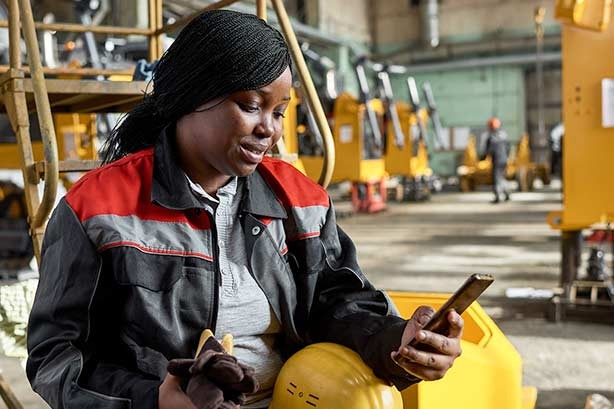Contractors are expanding their roles (for example, into design) at the same time cyber threats are increasingly more sophisticated and malicious. It’s essential to take steps to mitigate the resulting, evolving exposures.
Construction Industry Trends & Insights
Chubb keeps you informed as we craft your insurance protections.

Chubb is on top of the construction industry
The construction industry and its exposures are constantly evolving. Chubb’s construction specialists — including risk engineers — understand your risks and are dedicated to mitigating those threats.
Technology transforming the construction industry
As advancements in construction technology, products, and delivery methods hit the industry at a high rate, worksites are becoming smarter and more digitized. Chubb is transforming insurance products to meet the changing risks.



Read and learn from construction industry authorities
Take advantage of the deep knowledge, opinions, and advice from Chubb and other construction industry experts.
Promoting an effective safety culture and use of drones helps reduce fall fatalities in construction
Drones can offer a contractor with the ability to provide visual photographic or video feedback and data without putting workers at risk of a potential fall. Therefore, they can be a key part of your construction safety culture.
How construction companies can make the most of technology advancements
Developments in modular construction, building information management (BIM), and wearables can enhance project efficiencies and improve safety. They also present changing vulnerabilities for which you need to be prepared.
Building your risk solutions knowledge base
As the construction industry changes, Chubb helps keep you informed and on top. Providing you with thought leadership and data from industry experts and Chubb risk specialists is only one of the ways we do more for our clients.
Commitment, collaboration, communication, and accountability were key to the success of this insurance wrap-up. Designed for a capital program, unprecedented in vision and scope, the program yielded ongoing, positive results.
Meeting the challenges of environmental risks in international construction
Companies taking on international construction projects are subject to vastly differing local regulations, compliance scrutiny, and tax implications as well as the usual exposures. Chubb outlines the complexities and solutions.
Large plant owners who combine the workers' compensation and general liability for all the plant’s contractors get more control, reduce potential coverage gaps or overlaps, and typically save an average of 60 percent overall on insurance premiums.
A successful wrap-up will be one that eliminates or controls the frequency and severity of construction project accidents. From sponsor involvement to employee recognition, Chubb risk engineers detail how to achieve the goal.
Construction contracts often require coverage for environmental pollution, exposures likely be excluded from a standard commercial general liability policy. Chubb details the trends and the changing risks in this evolving market.
The U.S. Occupational Safety and Health Administration (OSHA) requires contractors to provide clear safety warnings on hazardous materials (like solvents, paints, and fuels), and consistently organized safety information.
Construction inherently poses environmental health risks that are especially hazardous for a medical facility building or renovation. A risk engineering assessment is advisable — as is the proper insurance to mitigate any exposures.
As U.S. construction contractors take on global projects, varying environmental laws present regulatory and compliance exposures. Your insurance partner needs to have deep international, construction, and environmental expertise.
In the event of accident or illness, worker access to timely and effective medical treatment can be challenging when the project is in a sparsely populated area or is on the move. Having an emergency response plan is critical.
At five percent profit margin, you would need $220,000 in revenue to make up for the average workers’ compensation fall-related loss. Creating a safer workplace can help you reduce accidents, injuries, and — ultimately — costs.
All-too-common mental health issues like addiction or suicidal despair can lead to especially deadly and costly consequences on a construction site. Knowledge and proactive workplace programs can help mitigate employee crises.
Falls account for a third of construction industry fatalities. Implementing strategies and practices to prevent falls is critical to maintaining a safe worksite and reducing the human and economic costs of workplace falls.
As contractors expand their roles in construction projects — for example taking on design or engineering consultation — and grow their technology use, they also increase their professional liability exposures.
With the aim of elevating awareness and enhancing the safety culture for construction firms, this guide identifies, explains, and recommends proactive safety procedures and practices that have proven successful.
Inhalable particles of crystalline silica are found in many construction operations and can lead to lung and other diseases and death. It’s critical to understand the legal standards, your exposures — and to mitigate your risks.
Construction can be a dangerous business. From hazard analysis and worker training through return-to-work plans, a proactive safety strategy can save lives, prevent injuries, reduce litigation costs, and improve productivity.
Wearable devices can increase construction safety and efficiency. Whether monitoring worker fatigue or keeping track of personnel on an active building site, wearables can be assets in ever-changing construction environments.
Technology is transforming everything from building design and construction methods to project management and worker safety. But these technologies come with evolving and heightened cyber exposures.
Chubb provides critical, data-backed insights for construction industry activity. Our overview of aspects such as growth markets, materials costs, and labor and employment trends can help you plan for and mitigate headwinds.
Create consistency and cost efficiency and reduce coverage uncertainty with our liability wrap ups. These controlled insurance programs (CIPs) combine general and excess liability for contractors and subcontractors under a single policy.

